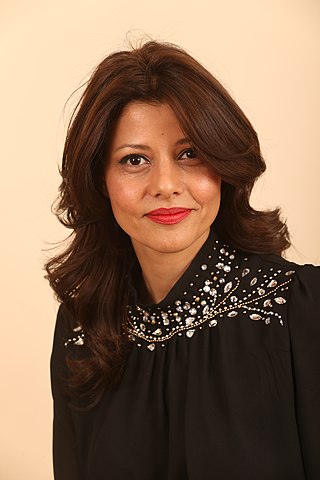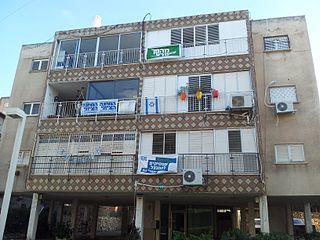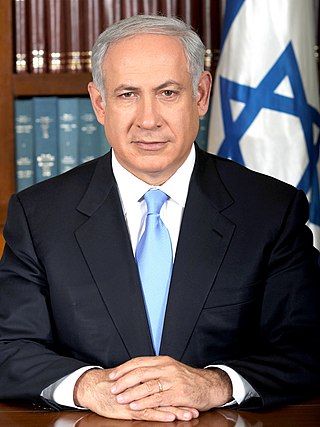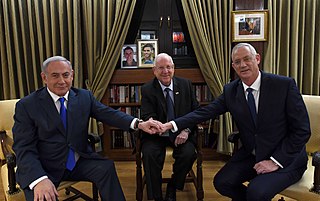| | ||||||||||||||||
| ||||||||||||||||
| ||||||||||||||||
| ||||||||||||||||
The 2013 Jerusalem mayoral election was held on 2 October, 2013, [1] and saw the reelection of Nir Barkat. [2]
Contents
The election was part of the 2013 Israeli municipal elections.
| | ||||||||||||||||
| ||||||||||||||||
| ||||||||||||||||
| ||||||||||||||||
The 2013 Jerusalem mayoral election was held on 2 October, 2013, [1] and saw the reelection of Nir Barkat. [2]
The election was part of the 2013 Israeli municipal elections.
Lion was regarded as the candidate of the far-right, as was strongly linked to Avigdor Lieberman. [3] The candidate of Likud-Yisrael Beiteinu [2] (an alliance between the Likud party led by Prime Minister Benjamin Netanyahu and the Yisrael Beiteinu party led by Lieberman), he was regarded as Lieberman's candidate. It was believed that Lieberman had hoped that a Lion victory would bolster his chances of potentially challenging Netanyahu's leadership. [3] Pundits observed that Haredi opponents of Netanyahu's government were supporting Lion in hopes a victory for him would help provide momentum to topple Netanyahu's coalition in the Knesset. [3] Also supporting Lion was Aryeh Deri, the chairman of the Shas party. [4] Lion did not receive the support of Netanyahu, who formally remained neutral in the race, but was speculated to favor Barkat. [4]
Barkat was endorsed by the Israel Hayom newspaper. Lion was endorsed by Yedioth Ahronoth . [4]
It was speculated that a last-minute agreement between Barkat and major sects of the city's Hasidic populace were key in delivering Barkat his reelection. [5]
While the coinciding municipal elections in most other cities relatively attracted little attention, Jerusalem's mayoral race attracted significant attention. [4] The election was tense and hard-fought. [4]
| 2013 Jerusalem mayoral elections results [1] [2] | |||
|---|---|---|---|
| Candidate | Party | Votes | % |
| Nir Barkat (incumbent) | Jerusalem Will Succeed | 111,108 | 51.91% |
| Moshe Lion | Likud-Yisrael Beiteinu | 95,411 | 44.57% |
| Chaim Epstein | Jerusalem Faction | 7,530 | 3.52% |
| Total | 214,049 | 100 | |

Likud, officially known as Likud – National Liberal Movement, is a major centre-right to right-wing political party in Israel. It was founded in 1973 by Menachem Begin and Ariel Sharon in an alliance with several right-wing parties. Likud's landslide victory in the 1977 elections was a major turning point in the country's political history, marking the first time the left had lost power. In addition, it was the first time in Israel that a right-wing party won the plurality of the votes. After ruling the country for most of the 1980s, the party lost the Knesset election in 1992. Likud's candidate Benjamin Netanyahu won the vote for Prime Minister in 1996 and was given the task of forming a government after the 1996 elections. Netanyahu's government fell apart after a vote of no confidence, which led to elections being called in 1999 and Likud losing power to the One Israel coalition led by Ehud Barak.
Yisrael Beiteinu is a secularist, nationalist right-wing political party in Israel. The party's base was originally secular Russian-speaking Israelis, although support from that demographic is in decline. The party describes itself as "a national movement with the clear vision to follow in the bold path of Zev Jabotinsky", the founder of Revisionist Zionism. It has primarily represented immigrants from the former Soviet Union, although it has attempted to expand its appeal to more established Israelis.

Kadima was a centrist and liberal political party in Israel. It was established on 24 November 2005 by moderates from Likud largely following the implementation of Ariel Sharon's unilateral disengagement plan in August 2005, and was soon joined by like-minded Labor politicians.

Uzi Landau is an Israeli politician and systems analyst. He served as a member of the Knesset for Likud between 1984 and 2006, and for Yisrael Beiteinu between 2009 and 2015. He also held several ministerial posts, including Minister of Public Security, Minister in the Prime Minister's Office, Minister of Energy and Water Resources and Minister of Tourism.

Ze'ev Elkin is an Israeli politician who currently serves as a Member of the Knesset for the National Unity Party. He was previously a member of the Knesset for Kadima, Likud and New Hope and served as Minister of Jerusalem Affairs, Minister of Housing and Construction, Minister of Immigrant Absorption, Minister of Environmental Protection, Minister of Higher Education and Minister of Water Resources.

Nir Barkat is an Israeli businessman and politician currently serving as the Minister of the Economy. He served as mayor of Jerusalem between the years 2008–2018.

Orly Levy-Abekasis is an Israeli politician and former member of the Knesset. Formerly a model, Levy-Abekasis first entered the Knesset in 2009 as a representative of Yisrael Beiteinu, but left the party in 2017 to sit as an independent. In 2019, she formed her own party, Gesher, to contest the April 2019 elections. Although the party failed to win a seat, she returned to the Knesset following the September 2019 elections, in which Gesher ran together with the Labor Party. In May 2020 she was appointed by Prime Minister Netanyahu as the newly created Minister for Community Empowerment and Advancement.

Carmel Shama-Hacohen is an Israeli lawyer and politician. He served as a member of the Knesset for Likud in two spells between 2009 and 2014, before becoming Israel's envoy to the OECD, UNESCO and the Council of Europe. In 2018 he was elected mayor of Ramat Gan.
Early elections for the nineteenth Knesset were held in Israel on 22 January 2013. Public debate over the Tal Law had nearly led to early elections in 2012, but they were aborted at the last moment after Kadima briefly joined the government. The elections were later called in early October 2012 after failure to agree on the budget for the 2013 fiscal year.

Early elections for the twentieth Knesset were held in Israel on 17 March 2015. Disagreements within the governing coalition, particularly over the budget and a "Jewish state" proposal, led to the dissolution of the government in December 2014. The Labor Party and Hatnuah formed a coalition, called Zionist Union, with the hope of defeating the Likud party, which had led the previous governing coalition along with Yisrael Beiteinu, Yesh Atid, The Jewish Home, and Hatnuah.
Likud Yisrael Beiteinu was an electoral alliance formed in 2012 by the center-right Likud and the right-wing Yisrael Beiteinu to contest the January 2013 Knesset elections.

The thirty-third government of Israel, also known as the third Netanyahu government, was formed after the 22 January 2013 Knesset elections, took office on 18 March 2013, and served until 14 May 2015. The Prime Minister was Benjamin Netanyahu of Likud; the government was a coalition of Likud, Yisrael Beiteinu, Yesh Atid, The Jewish Home, and Hatnuah.
Indirect presidential elections were held in Israel on 10 June 2014. The result was a victory for Reuven Rivlin of the Likud party. Rivlin was sworn in as President of Israel on 24 July.
Early legislative elections were held in Israel on 9 April 2019 to elect the 120 members of the 21st Knesset. Elections had been due in November 2019, but were brought forward following a dispute between members of the current government over a bill on national service for the ultra-Orthodox population, as well as impending corruption charges against incumbent Prime Minister Benjamin Netanyahu.

The thirty-fifth government of Israel, or the Netanyahu–Gantz government, was the government of Israel which was sworn in on 17 May 2020 and dissolved on 13 June 2021.

Moshe Lion, or Moshe Leon, is an Israeli politician who is currently the Mayor of Jerusalem. He previously served as a member of the Jerusalem City Council, director-general of the Prime Minister's Office, Chairman of the Israel Railways, and head of the Jerusalem Development Authority.
Snap legislative elections were held in Israel on 17 September 2019 to elect the 120 members of the 22nd Knesset. Following the previous elections in April, incumbent Prime Minister Benjamin Netanyahu failed to form a governing coalition for a second consecutive time. On 30 May, the Knesset voted to dissolve itself and trigger new elections, in order to prevent Blue and White party leader Benny Gantz from being appointed Prime Minister-designate. This election marked the first time the Knesset voted to dissolve itself before a government had been formed.
Legislative elections were held in Israel on 23 March 2021 to elect the 120 members of the 24th Knesset. It was the fourth election in two years. Yair Lapid and Naftali Bennett announced that they had formed a rotation government on 2 June 2021, which was approved on 13 June 2021.

The 2018 Jerusalem mayoral election was held on 30 October and 13 November 2018 to elect the mayor of Jerusalem.
Elections are held in Jerusalem to elect the city's mayor. Currently, such elections are regularly scheduled to elect mayors to five-year terms.